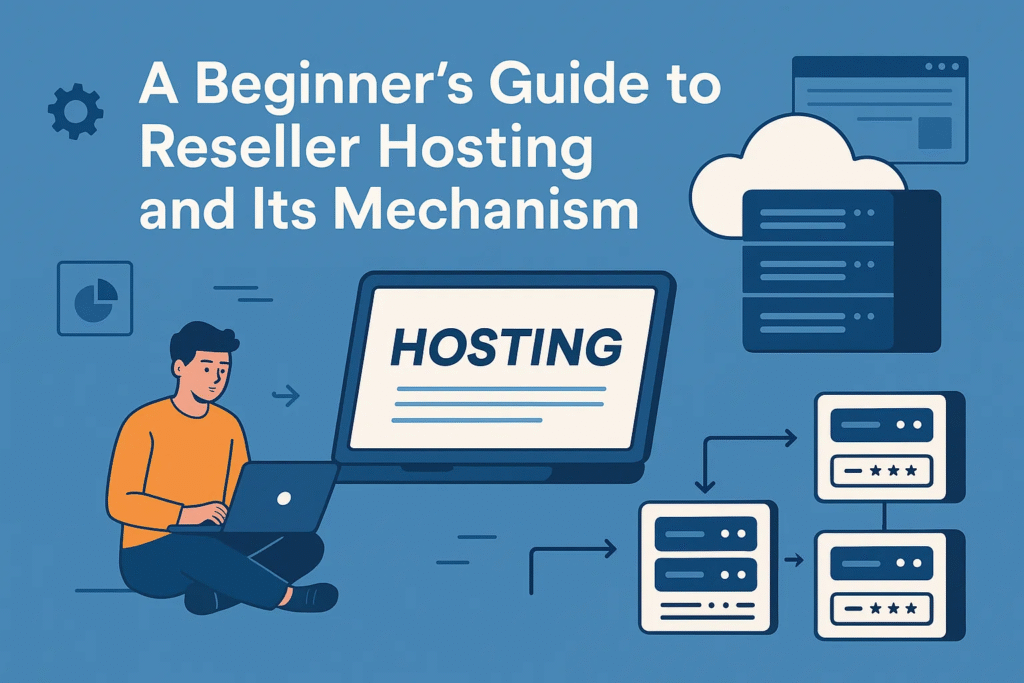Introduction
The web hosting industry has evolved drastically over the past decade. Among the several types of hosting solutions, reseller hosting has become one of the most popular business models for entrepreneurs who want to start their own hosting service without investing heavily in infrastructure.
If you’ve ever wondered how to start your own hosting company without purchasing expensive servers, hiring IT staff, and managing complex systems, reseller hosting is the answer. This guide breaks down the essentials, benefits, and mechanisms of reseller hosting in a beginner-friendly way.
What Is Reseller Hosting?
Reseller hosting is a type of web hosting where you buy hosting resources (like disk space, bandwidth, and domains) from a larger hosting company and then resell them to your own customers under your brand. Think of it as renting an apartment building, dividing it into smaller units, and subleasing them for profit.
Key aspects of reseller hosting:
-
You don’t own the servers; you lease them from a provider.
-
You can create and manage multiple hosting accounts for clients.
-
It’s a white-label solution — your customers see your brand, not the parent host.
-
It requires less upfront investment compared to setting up your own data center.
Why Reseller Hosting Is Popular
-
Low Start-Up Costs – No need to buy or maintain servers.
-
Scalability – Start small and scale as your client base grows.
-
White Label Branding – Build your own brand and reputation.
-
Recurring Income – Earn steady monthly revenue.
-
Control Over Pricing – Set your own pricing plans and packages.
How Reseller Hosting Works: The Mechanism
To understand reseller hosting, it’s important to see the moving parts. Below is a simple breakdown of how it functions:
-
Purchase Resources from a Hosting Provider
You choose a hosting company offering reseller hosting packages. They provide storage, bandwidth, and management tools. -
Divide Resources into Hosting Plans
Using the control panel (like WHM – Web Host Manager), you allocate specific amounts of storage, bandwidth, and features to each client account. -
Sell Hosting to Clients Under Your Brand
You create your own packages and pricing, then market them to clients as your own hosting service. -
Provide Support
Most reseller hosting providers handle server maintenance. You focus on customer support, billing, and management. -
Earn Profits
The difference between what you pay your provider and what your customers pay you is your profit margin.
Advantages of Reseller Hosting
| Advantages | Explanation |
|---|---|
| Low Investment | No expensive servers or infrastructure needed. |
| Scalable Business Model | Easily upgrade resources as customer base grows. |
| Passive Income | Recurring monthly revenue stream. |
| Brand Building | White-label services allow you to present hosting as your own. |
| Focus on Business | Provider handles technical server issues, you focus on sales & support. |
Disadvantages / Limitations of Reseller Hosting
| Disadvantages | Explanation |
|---|---|
| Limited Server Control | The parent host controls server settings, not you. |
| Dependency on Provider | Downtime or issues at the provider level affect your business. |
| Support Responsibility | Even though the provider manages servers, you must handle client support. |
| Resource Limitations | Over-selling can lead to poor performance and client dissatisfaction. |
Key Features of a Good Reseller Hosting Provider
| Feature | Why It’s Important |
|---|---|
| White Label Branding | Ensures your clients see your brand only. |
| WHM/Control Panel Access | Simplifies account management for multiple customers. |
| 24/7 Technical Support | Reliable support for emergencies and issues. |
| Scalable Resources | Ability to upgrade storage and bandwidth as you grow. |
| Security Features | SSL certificates, firewalls, and malware scanning. |
| Automated Billing | Integration with WHMCS or similar tools for client billing. |
Understanding the Mechanism in Detail
| Step | Details |
|---|---|
| 1. Choose a Reseller Plan | Select a parent host offering disk space, bandwidth, and features. |
| 2. Set Up WHM | Use Web Host Manager (WHM) to create packages for customers. |
| 3. Create Hosting Packages | Decide on storage, bandwidth, emails, and databases for each plan. |
| 4. Sell Hosting to Clients | Market your packages under your brand name. |
| 5. Manage Billing & Support | Use billing software like WHMCS to handle invoices and tickets. |
| 6. Grow and Scale | Upgrade your reseller account as your customer base increases. |
Business Model: How to Earn with Reseller Hosting
-
Monthly Hosting Plans: Sell hosting packages at a monthly fee.
-
Upselling Add-ons: Offer SSL certificates, backups, premium support, or domains.
-
Bundle Services: Combine hosting with web design, SEO, or maintenance.
-
Affiliate Programs: Offer affiliate commissions to drive traffic and sales.
Step-by-Step Guide to Starting Your Reseller Hosting Business
1. Research and Select a Reseller Hosting Provider
Look for a provider with a strong uptime record, security, 24/7 support, and scalability.
2. Register a Domain and Set Up Branding
Create your own website with your brand name, logo, and unique design.
3. Choose Hosting Packages and Pricing
Calculate costs, add a profit margin, and create at least 2–3 different hosting plans.
4. Integrate Billing & Support Systems
Use tools like WHMCS, Blesta, or ClientExec for automated billing, provisioning, and ticket management.
5. Market Your Hosting Services
Use social media, SEO, ads, and partnerships to attract clients.
6. Provide Excellent Customer Support
Your support quality can make or break your reseller hosting business.
Best Practices for Reseller Hosting Success
-
Avoid overselling resources.
-
Offer excellent customer support.
-
Keep your pricing competitive but profitable.
-
Always choose a reputable hosting provider.
-
Regularly back up your clients’ data.
-
Stay updated with hosting technologies and trends.
Common Mistakes to Avoid
| Mistake | Why It’s a Problem |
|---|---|
| Overselling resources | Leads to slow performance and unhappy clients. |
| Ignoring customer support | Dissatisfied customers may leave or leave bad reviews. |
| Choosing cheap unreliable providers | Downtime and poor performance hurt your business reputation. |
| Not investing in branding | Without branding, it’s hard to stand out in the crowded hosting market. |
| Lack of marketing efforts | Without marketing, your client base will not grow. |
Comparison Table – Reseller Hosting vs Shared Hosting
| Feature | Reseller Hosting | Shared Hosting |
|---|---|---|
| Ownership | You act as a mini-hosting company. | End users host their website directly. |
| Control | WHM + cPanel, create multiple accounts. | Single cPanel for one site. |
| Branding | White label possible. | No branding — you’re a customer only. |
| Profit Potential | Yes — you resell hosting. | No — just hosting your own site. |
| Investment | Low to medium. | Very low. |
Scaling Your Reseller Hosting Business
-
Upgrade to higher-tier reseller plans as your client base grows.
-
Hire staff for customer support or outsource it.
-
Introduce VPS or dedicated server hosting in the future.
-
Offer value-added services like website migration, managed hosting, and premium security.
Marketing Strategies for Reseller Hosting
-
Build a professional website showcasing your hosting plans.
-
Run paid ads targeting small businesses, web developers, and agencies.
-
Provide free trials or discounted first-month pricing.
-
Create blog posts, guides, and tutorials to build authority.
-
Partner with web designers or agencies for referrals.
Why Choose Reseller Hosting Over Other Business Models?
Reseller hosting is ideal for:
-
Web designers who want to offer hosting as an add-on.
-
Agencies providing all-in-one digital services.
-
Entrepreneurs who want a low-risk entry into the hosting business.
Future Trends in Reseller Hosting
-
Cloud-Based Reseller Hosting – More flexibility and scalability.
-
Automation Tools – Reduced manual tasks and improved client onboarding.
-
Enhanced Security – More demand for SSL, firewalls, and DDoS protection.
-
Green Hosting – Environmentally conscious hosting providers gaining popularity.
Conclusion
Reseller hosting offers a powerful, low-cost opportunity to launch your own hosting business. With the right provider, branding, and marketing strategy, you can build a sustainable revenue stream and scale over time.
The mechanism is straightforward: purchase hosting resources, divide them into packages, sell them to clients, and manage support and billing. With good customer service and careful planning, reseller hosting can become a reliable and profitable venture.

